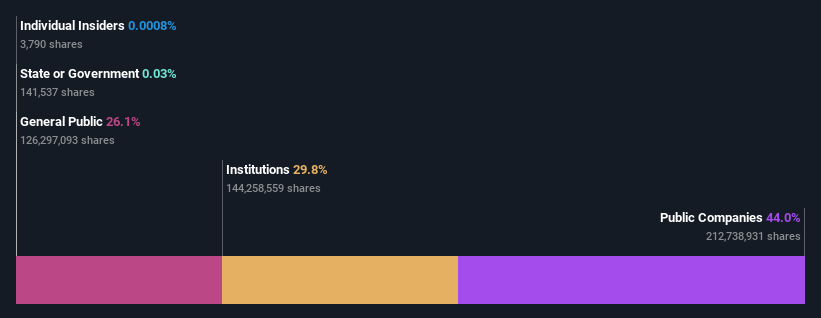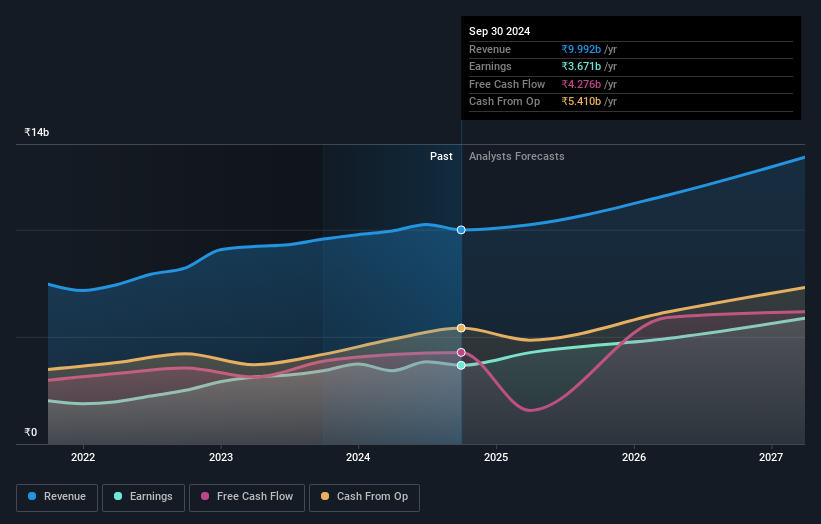- India
- /
- Infrastructure
- /
- NSEI:GPPL
Gujarat Pipavav Port Limited's (NSE:GPPL) 4.7% loss last week hit both individual investors who own 44% as well as institutions
Key Insights
- The considerable ownership by public companies in Gujarat Pipavav Port indicates that they collectively have a greater say in management and business strategy
- The top 2 shareholders own 52% of the company
- Institutions own 30% of Gujarat Pipavav Port
Every investor in Gujarat Pipavav Port Limited (NSE:GPPL) should be aware of the most powerful shareholder groups. The group holding the most number of shares in the company, around 44% to be precise, is public companies. In other words, the group stands to gain the most (or lose the most) from their investment into the company.
While institutions, who own 30% shares weren’t spared from last week’s ₹4.4b market cap drop, public companies as a group suffered the maximum losses
In the chart below, we zoom in on the different ownership groups of Gujarat Pipavav Port.
See our latest analysis for Gujarat Pipavav Port

What Does The Institutional Ownership Tell Us About Gujarat Pipavav Port?
Institutions typically measure themselves against a benchmark when reporting to their own investors, so they often become more enthusiastic about a stock once it's included in a major index. We would expect most companies to have some institutions on the register, especially if they are growing.
We can see that Gujarat Pipavav Port does have institutional investors; and they hold a good portion of the company's stock. This can indicate that the company has a certain degree of credibility in the investment community. However, it is best to be wary of relying on the supposed validation that comes with institutional investors. They too, get it wrong sometimes. If multiple institutions change their view on a stock at the same time, you could see the share price drop fast. It's therefore worth looking at Gujarat Pipavav Port's earnings history below. Of course, the future is what really matters.

Gujarat Pipavav Port is not owned by hedge funds. The company's largest shareholder is A.P. Møller - Mærsk A/S, with ownership of 44%. Meanwhile, the second and third largest shareholders, hold 7.9% and 3.4%, of the shares outstanding, respectively.
To make our study more interesting, we found that the top 2 shareholders have a majority ownership in the company, meaning that they are powerful enough to influence the decisions of the company.
While it makes sense to study institutional ownership data for a company, it also makes sense to study analyst sentiments to know which way the wind is blowing. There are a reasonable number of analysts covering the stock, so it might be useful to find out their aggregate view on the future.
Insider Ownership Of Gujarat Pipavav Port
The definition of an insider can differ slightly between different countries, but members of the board of directors always count. Management ultimately answers to the board. However, it is not uncommon for managers to be executive board members, especially if they are a founder or the CEO.
Insider ownership is positive when it signals leadership are thinking like the true owners of the company. However, high insider ownership can also give immense power to a small group within the company. This can be negative in some circumstances.
Our data suggests that insiders own under 1% of Gujarat Pipavav Port Limited in their own names. Keep in mind that it's a big company, and the insiders own ₹699k worth of shares. The absolute value might be more important than the proportional share. It is always good to see at least some insider ownership, but it might be worth checking if those insiders have been selling.
General Public Ownership
The general public, who are usually individual investors, hold a 26% stake in Gujarat Pipavav Port. This size of ownership, while considerable, may not be enough to change company policy if the decision is not in sync with other large shareholders.
Public Company Ownership
Public companies currently own 44% of Gujarat Pipavav Port stock. We can't be certain but it is quite possible this is a strategic stake. The businesses may be similar, or work together.
Next Steps:
It's always worth thinking about the different groups who own shares in a company. But to understand Gujarat Pipavav Port better, we need to consider many other factors. For instance, we've identified 1 warning sign for Gujarat Pipavav Port that you should be aware of.
If you would prefer discover what analysts are predicting in terms of future growth, do not miss this free report on analyst forecasts.
NB: Figures in this article are calculated using data from the last twelve months, which refer to the 12-month period ending on the last date of the month the financial statement is dated. This may not be consistent with full year annual report figures.
New: Manage All Your Stock Portfolios in One Place
We've created the ultimate portfolio companion for stock investors, and it's free.
• Connect an unlimited number of Portfolios and see your total in one currency
• Be alerted to new Warning Signs or Risks via email or mobile
• Track the Fair Value of your stocks
Have feedback on this article? Concerned about the content? Get in touch with us directly. Alternatively, email editorial-team (at) simplywallst.com.
This article by Simply Wall St is general in nature. We provide commentary based on historical data and analyst forecasts only using an unbiased methodology and our articles are not intended to be financial advice. It does not constitute a recommendation to buy or sell any stock, and does not take account of your objectives, or your financial situation. We aim to bring you long-term focused analysis driven by fundamental data. Note that our analysis may not factor in the latest price-sensitive company announcements or qualitative material. Simply Wall St has no position in any stocks mentioned.
About NSEI:GPPL
Gujarat Pipavav Port
Engages in the construction, operation, and maintenance of port at Pipavav in Gujarat, India.
Flawless balance sheet with solid track record.
Market Insights
Community Narratives




